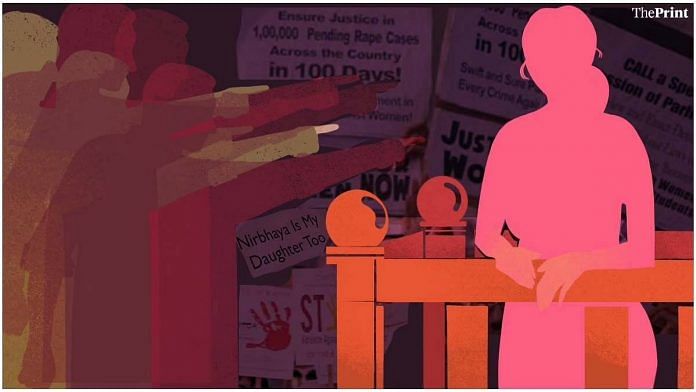It’s not just foreign tourists who face sexual violence in India; the issue is even more severe when it comes to our own women. Take the infamous RG Kar rape and murder case, where a 31-year-old postgraduate medical intern was raped at RG Kar Medical College and Hospital in Kolkata in August 2024. The nation was enraged as one. Prime Minister Narendra Modi himself mentioned the case during his Independence Day address at the Red Fort, urging “every government” to treat such cases with the utmost seriousness. Fast-forward to 2025, and the mother of the victim still longs for justice—herself pleading for a meeting with the PM in March. “Our daughter had dreamt big, and we never thought that she would have to die like this. It’s been seven months since she left us, but where is justice?”
Culture of silence, impunity
The core of the crisis is not just the frequency of the offenses, but the failure of the system to prevent them or mete out justice. The Nirbhaya rape case in 2012 saw millions take to the streets. For the first time, it seemed like the country had woken up. There was outrage, solidarity, and a spark of hope that things would change.
But about a decade-and-a-half on, that hope has faded, and things remain as they were. The crimes are as heinous—sometimes even worse. The legislation might have changed, but the attitude, the lack of fear on the part of rapists, and the breakdown of justice still persist. The conviction rate for offenses against women in India, for one, was a pathetic 27-28 per cent from 2018-2022.
Where is the fear of the law? When the perpetrators see no consequences, their impunity grows. After the Hampi rape incident, the headlines faded, with barely any follow-up reports. Were the rapists caught, tried, punished? The public has been left in the dark. It shows that justice in India is often a whispered hope rather than a guaranteed right.
Also read: Does India have a rape culture? Pick a newspaper, maybe a mirror
Statistics hide reality
As per statistics from the National Crime Records Bureau (NCRB), 31,677 rape cases were registered in 2021—a daily average of 86 cases, that is. But these figures represent only what has been reported. The truth is much darker. Ex-IPS officer SR Darapuri pointed out alarming instances in the Hathras gang rape and killing, where the police did not even take the victim’s statement, tampered with official documents, and tried to cremate her body secretly in the dead of night.
Marital rape, astonishingly, is still beyond the reach of criminal law in India. Non-marital, non-consensual sex is legally defined as rape, but the same act within a marriage does not have any legal ramifications. If marital rape were to be covered, sexual violence rates would mushroom to astronomical levels even on paper.
As of 2018, a staggering 99 per cent of sexual assault cases went unreported in the country – especially where spousal violence was involved. The same assertion was given further credence by the National Family Health Survey (NFHS), according to which approximately 30 per cent of Indian women suffered physical and sexual violence at their partners’ hands.
Also read: When ‘good men’ are silent on rape, every Indian woman suffers. So we say ‘yes all men’
The distorted mindset
Contrary to popular belief, rapists are not necessarily strangers lurking in dark alleys. They can be a relative, neighbour, or acquaintance too. The overwhelming majority are young men, usually poorly educated, and influenced by a society that dehumanises women.
When researchers questioned convicted rapists if they had ever forced someone to do something sexual, many said yes. But when asked if they had ever raped someone, they said no. The psychological warpedness is terrifying. Many rapists never feel bad about their actions, calling the act either the victim’s mistake or something that the victim wanted—justifying their actions instead of taking responsibility.
Victim-blaming is deeply entrenched, too. “She shouldn’t have gone out at night, or “She shouldn’t have worn such revealing clothes,” they often say. This criminal, distorted way of thinking has unfortunately been normalised. It reveals the truth about our society – where women are seen not as autonomous human beings but as objects to be policed, controlled, or violated.
An often-overlooked dimension of rape is that perpetrators employ tactics of power, coercion, and fear to erode the victim’s sense of self-worth, rendering them feeling helpless or complicit. The harm inflicted leaves profound emotional scars that endure long after the body has healed.
Rape is not merely an act of lust; it is also a tool to assert dominance that is rooted in a toxic culture of entitlement, which in turn seeks to strip individuals of their autonomy. The perpetrator asserts authority over the victim, reinforcing harmful gender dynamics and societal inequalities.
Until society addresses the deeply ingrained attitudes of entitlement, control, and victim-blaming, true justice and equality for women will remain out of reach.
Also read: I’m an Indian woman, I’m tired of outraging. Jharkhand tourist gangrape won’t change a thing
What must change
India’s rape crisis is not merely a failure of law – it is also a failure of society, socialisation, and social conditioning. For far too long, families have raised their sons in a culture of entitlement and not empathy, raising men who have no idea how to respect women, honour consent, or recognise gender equality as essential. This silence at home becomes complicity in society. If young men are not informed that women are their peers—with equal rights, equal agency, and equal dignity—then no law will succeed in stopping the ensuing violence.
Laws can be drafted and redrafted, and punishments can be increased—but until the culture of sexual violence, victim-shaming, and covering up for perpetrators persists, justice cannot be attained. The social psyche—firmly rooted in patriarchy, victim-shaming, and the poisonous ideas of honour—makes rape not just a possibility, but an often-nurtured protectorate.
The success of every justice system hangs on two points: the rigidity of penalty and the chance of conviction. India has continued to emphasise the former, often announcing stiffer punishments for perpetrators. But this policy has not borne fruit. The truth is brutal yet clear: fear of punishment only works if conviction is probable. In India, it often isn’t. Moreover, increasing penalties may ironically deter victims from reporting such incidents—especially if the rapist is a family member or acquaintance. The long-term solution lies not only in tougher laws, but in transforming mindsets.
Education, consciousness, and right awareness for respectful coexistence of genders need to become absolute prerequisites. Young women need to learn their rights, too. Schools need to instill gender equality as a lived value rather than a theoretical one.
As a nation, we need to address this epidemic not only in courts but in classrooms, in homes, in the media, and on the streets. Because until we do, no woman in India will ever be safe.
A nation cannot rise while half its soul is shackled in fear. Until India learns to protect and not police its women, it will never truly be free.
Karti P Chidambaram is a Member of Parliament for Sivaganga, and a Member of the All India Congress Committee. His X handle is @KartiPC. Views are personal.
(Edited by Zoya Bhatti)
var ytflag = 0;
var myListener = function() {
document.removeEventListener(‘mousemove’, myListener, false);
lazyloadmyframes();
};
document.addEventListener(‘mousemove’, myListener, false);
window.addEventListener(‘scroll’, function() {
if (ytflag == 0) {
lazyloadmyframes();
ytflag = 1;
}
});
function lazyloadmyframes() {
var ytv = document.getElementsByClassName(“klazyiframe”);
for (var i = 0; i < ytv.length; i++) {
ytv[i].src = ytv[i].getAttribute('data-src');
}
}








